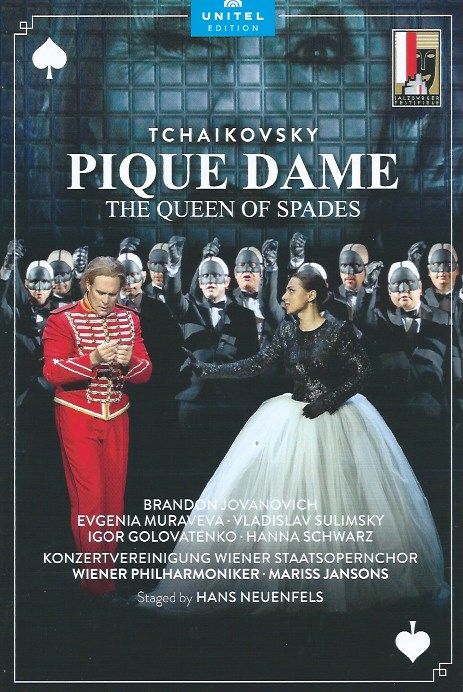Tchaikovsky Queen of Spades
A salutary reminder of the greatness of Tchaikovsky's operatic works

A particularly telling release this one, given the sad death of Mariss Jansons (1943-2019) - I should also mention an limited deluxe edition of an LP (yes, an LP) of Brahms Fourth Symphony of Jansons' last concert, Live at Carnegie Hall with the Bavarian Radio Symphony Orchestra, is also available on BR Klassik, a class production in every way. Here, though, in Tchaikovsky, he has the Vienna Philharmonic at his disposal in the pit; and musically, this is a triumph. While one might not naturally associate the Vienna Phiharmonic with Russian music, one shoould not forget, for example, the fabulous Gergiev performances of the late Tchaikovsky symphonies with this orchestra.
The Queen of Spades, Tchaikovsky's Op. 68 (catalogue numbers are much less frequently used for operas, for some reason) is an archetypically Romantic tale of passion with a spicing of the supernatural after Pushkin. The libretto is actually by the composer's brother, Modest Tchaikovsky. The romantic love rivalry for Lisa, betrothed to Prince Yeletsky yet worshipped by Hermann, so-exists with the story of the Countess' secret of three cards , a winning combination that enabled the Countess, many moons ago, to win a fortune in Paris. The prophesy that she will die at the hands of someone who attempts to exort the secret from her comes true; she dies of fright when Hermann draws a pistol at her. The final act ends in tragedy: Lisa drowns herself when she realises she has lost him, and, whne in teh final card he draws he sees the Countess' face in the Queen of Spades (hence the opera's title), Hermann also commits suicide.
The staging, by Hans Neuenfels, is modernist in its powerfully minimal sets. The darkness that prevails could well indicate the brooding of fate, the inevitability of tragedy. A green gaming table is the only colour in the opening scene, for example (it will eventually hold Hermann's corpse), except for Hermann's red and gold slightly deconstructed uniform - he wears the top open with no shirt underneath. Only the Countess' clinical bed chamber later acts as stark contrast, but what it really says is that the underlying bleakness is now hospital starched. Even the chorus' bathing scene is somewhat disturbing, the water indicated by projection against a gray background, the dress code again containing anomalies: period bathing costumes, but why is one gentleman still wearing a formal top hat with his? And the figure of Catherine the Great is like something from the Dios de los muertos is arresting, to say the least.
Yet Tchaikovsky's music prevails, and how. Not least because of the superb Lisa of Evgenia Muraveva and the strong Hermann of Brandon Jovanovich. But maybe it is the Countess of Hanna Schwarz that offers the most mesmeric dramatic experience here - Schwarz absolutely commands the stage. The role of the Countess had, incidentally, been taken by the great Rosalind Plowright at Opera Holland Park with Nataliya Romaniw as a career-defining Lisa; review.
A salutary reminder of the greatness of Tchaikovsky's operatic works. The flow of invention is endless; the dramatic realisation faultless.
